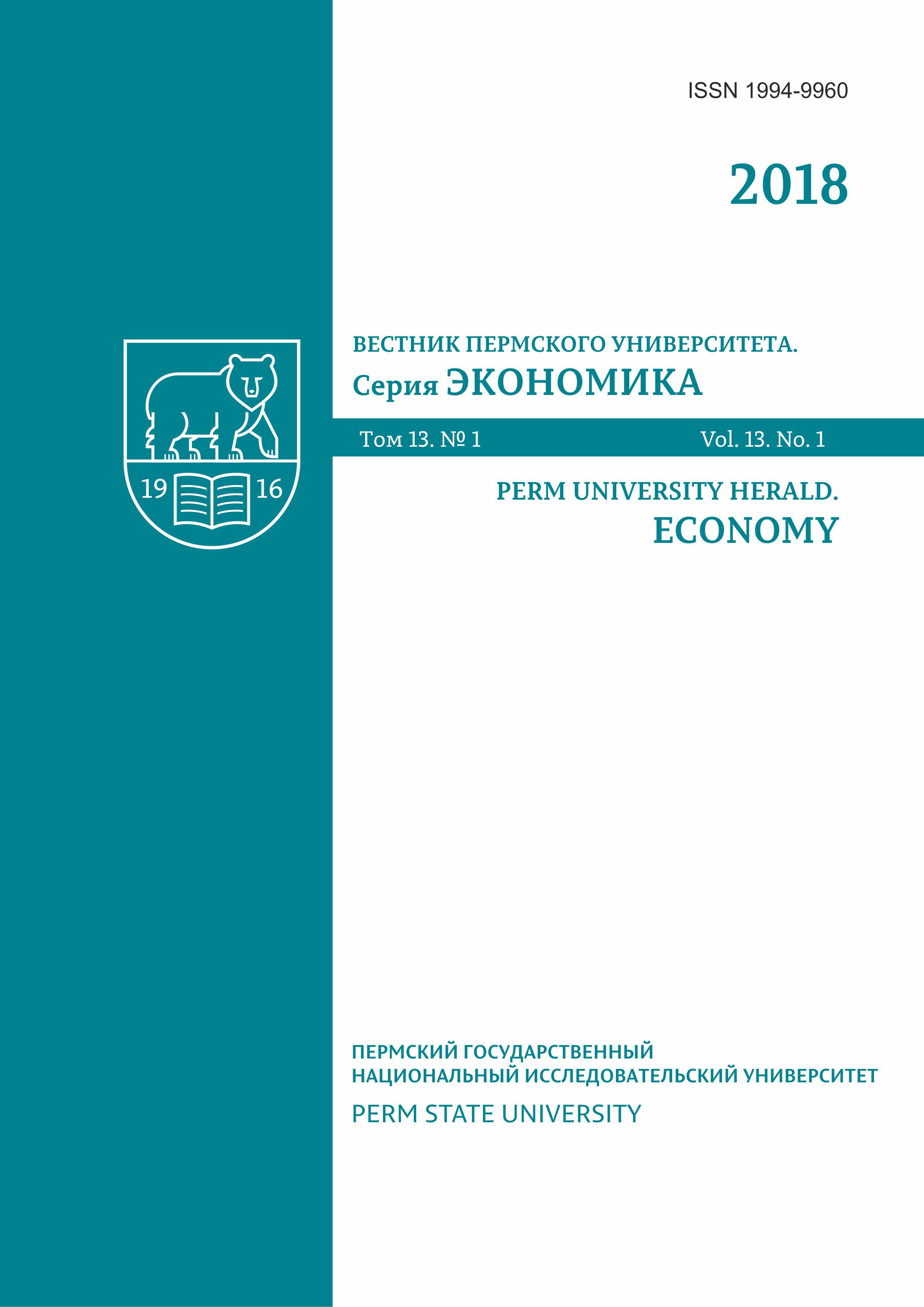Prospects to create “smart cities” in Russia: Classification of problems and their solutions
DOI:
https://doi.org/10.17072/1994-9960-2018-1-75-89Abstract
Due to high urbanization rate the issues of smart and sustainable city planning become very important currently. The planning and development of the concept “smart city” is based on these issues. Reasonable planning of city environment makes opportunities for city competitiveness increase and reduces negative trends in their development. Modern interpretations and approaches to the “smart city” concept are based on many factors. Among them are the increase of economic potential and budget security, the decline of ecological impact, human resources capitalization based on digital technologies application in society development. The review of literature that has been made allows us to classify “smart cities”, to determine features and to specify aims and tasks for their development. Using a definitional analysis the original comprehension of the “smart city” concept has been suggested. According to this interpretation a “smart city” is considered to be a city which resources are efficiently used by all participants, first of all by city- dwellers providing comfort, safety and eco – friendly environment. The analysis of Russian and foreign experience in the field of the “smart city” concept implementation, the results of a particularized inquiry and interview including those organized with the international professional social network Linkedin allowed us to reveal key challenges in “smart city” development. The most crucial among them are organizational, financial, infrastructural and technological obstacles that prevent the “smart city” concept implementation. We have substantiated that the solutions of the revealed problems in the case study of Russia first of all should concern the digitization of a city utilities sector, power engineering, building and public transport. They are also associated with wide-spread application of integrated digital platforms in management and education, in control over environmental pollution in the frameworks of the “Digital economy in the Russian Federation” program implementation. The prospects to create smart cities in Russia have been determined by means of identification of conditions for the solution of the acute tasks of digitization of regional and city agglomeration economy. We have formulated the trends of relevant studies of “smart cities” in the perspectives of development and implementation priority of the project “smart city” at all levels of public management. Also a methodology to calculate a long-term economic effect that will be caused by the project implementation has been developed.
Keywordsa “smart city” concept, a smart city, city environment, city economy management, digital economy, information and communication technologies, intelligent systems, infrastructure, ecology, development perspectives
For citationVeselova A.O., Khatskelevich A.N., Ezhova L.S. Prospects to create “smart cities” in Russia: Classification of problems and their solutions. Perm University Herald. Economy, 2018, vol. 13, no. 1, pp. 75–89. DOI 10.17072/1994-9960-2018-1-75-89
References1. Mora L., Bolici R. How to become a smart city: Learning from Amsterdam. In book: Bisello A., Vettorato D., Stephens R., Elisei P. (eds) Smart and sustainable planning for cities and regions. Springer, 2015. pp. 251–266.
2. Florida R. The rise of the creative class: And how it's transforming work, leisure, community and everyday life. New York, Basic Books, 2007. 432 p.
3. Bakici T., Almirall E., Wareham J. A smart city initiative: The case of Barcelona. Journal of the Knowledge Economy, 2013, vol. 4, iss. 2, pp. 135–148.
4. Estevez E., Lopes N.V., Janowski T. Smart sustainable cities – Reconnaissance study. United Nations University. Operating Unit ON Policy-Driven. Electronic Governance. Canada, 2017. Available at: https://joinup.ec.europa.eu/sites/default/files/smart_cities_report.pdf (accessed 25.07.2017).
5. Ovchinnikov A. Vvedenie v problematiku Smart Siti [Introduction to the problems of smart city]. Gorodskie taktiki. Gorodskie teorii. Sart siti. Al'manakh [Urban Tactics. City Theories. Smart City. Anthology], 2015, no. 7, pp. 3–7. (In Russian).
6. Inyutsyn A.Yu. Umnye tekhnologii stanovyatsya dostupnee dlya gorodov [Smart technologies become available for cities]. Praktika munitsipal'nogo upravleniya [Municipal Management Practice], 2017, no. 2, pp. 46–55. (In Russian).
7. Harrison C., Donnelly I.A. A Theory of smart cities. Proceedings of the 55th Annual Meeting of the International Society for the Systems Sciences. Held at University of Hull Business School. UK, 2011, pp. 1–15.
8. Angelidou M. Smart city policies: A spatial approach. Cities, July 2014, pp. S3–S11. Available at: https://www.researchgate.net/publication/274166044_Smart_city_polic
ies_A_spatial_approach (accessed 19.06.2017).
9. Kaufman T., Bothe D., Gawlik W., Ponweiser K. Optimization of load flows in urban hybrid networks. In book: Bisello A., Vettorato D., Stephens R., Elisei P. (eds) Smart and sustainable planning for cities and regions. Springer, 2015, pp. 1–15.
10. Albino V., Berardi U., Dangelico R.M. Smart cities: Definitions, dimensions, performance and initiatives. Journal of Urban Technology, 2015, vol. 22, iss. 1, pp. 3–21. Available at: http://www.tandfonline.com/doi/pdf/10.1080/10630732.2014.942092?needAccess=true (accessed 12.08.2017).
11. Kola-Bezka M., Czupich M., Ignasiak-Szulc A. Smart cities in Central and Eastern Europe: Viable future or unfulfilled dream? Journal of International Studies, 2016, vol. 9, no. 1, pp. 76–87. doi: 10.14254/2071-8330.2016/9-1/6. Available at: http://www.jois.eu/files/JIS_Vol9_No1_Kola-Bezka_Czupich_Ignasiak-Szulc.pdf (accessed 19.06.2017).
12. Harrison C., Eckman B., Hamilton R., Hartswick P., Kalagnanam J., Paraszczak J., Williams P. Foundations for smarter cities. IBM. Journal of Research and Development, 2010, vol. 54, no. 4, pp. 1–16. Available at: http://fumblog.um.ac.ir/gallery/902/Foundations%20for%20Smarter%
20Cities.pdf (accessed 15.07.2017).
13. Nam T., Pardo T.A. Conceptualizing smart city with dimensions of technology, people, and institutions. Proceedings of the 12th Annual International Conference on Digital Government Research, 2011, pp. 282–291. Available at: https://inta-aivn.org/images/cc/Urbanism/background%20documents/dgo_2011_sm
artcity.pdf (accessed 12.08.2017).
14. Pierce P., Andersson B. Challenges with smart cities initiatives – A municipal decision makers’ perspective. Proceedings of the 50th Hawaii International Conference on System Sciences, 2017, pp. 2804–2813. Available at: http://aisel.aisnet.org/hicss-50/eg/smart_cities_smart_government/3/ (accessed 25.07.2017).
15. Alshenqeeti H. Interviewing as a data collection method: A critical review. English Linguistics Research, 2014, vol. 3, no. 1, pp. 39–45. doi: 10.5430/elr.v3n1p39.
16. Baron G., Brinkman J., Wenzler I. Supporting sustainability through smart infrastructures: The case for the city of Amsterdam. International Journal of Critical Infrastructures, 2012, vol. 8, no. 2/3, pp. 169–177. doi: 10.1504/IJCIS.2012.049036.
17. Anthopoulos L., Janssen M., Weerakkody V. A unified smart city model (USCM) for smart city conceptualization and benchmarking. International Journal of Electronic Government Research, 2016, vol. 12, iss. 2, pp. 77–93.











